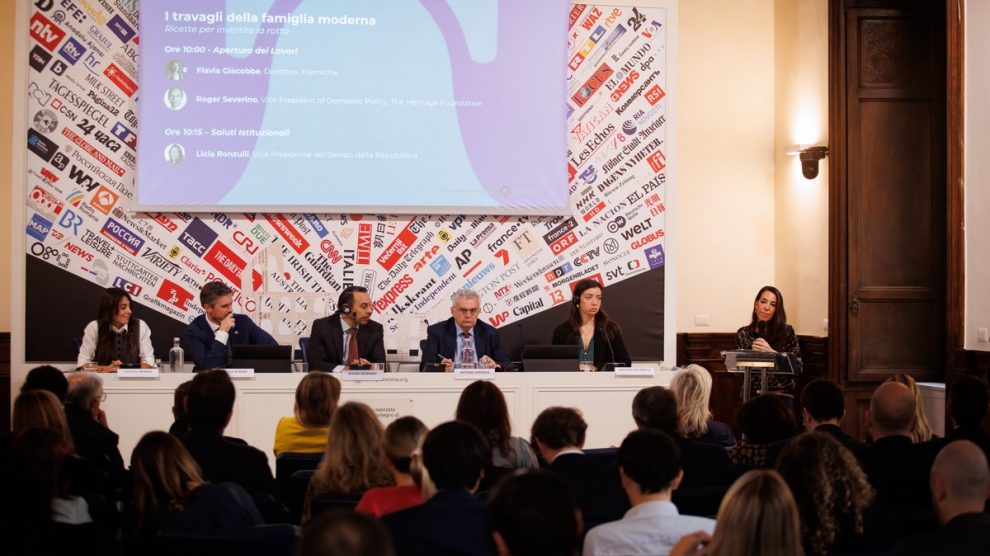The event brought together policymakers, scholars, and institutional representatives to explore the roots and potential solutions to the demographic decline. Flavia Giacobbe, editor-in-chief of Formiche, and Roger Severino, vice president for domestic policy at the Heritage Foundation, opened the discussion alongside Licia Ronzulli, vice president of the Italian Senate. All three stressed how the challenge of declining birth rates is intertwined with fiscal policies, cultural models, and gender perceptions.
The debate. The first panel, moderated by Kristen Ziccarelli (America First Policy Institute), focused on the social and structural barriers to family formation. Ylenja Lucaselli (Italian Chamber of Deputies) emphasised women’s sacrifices in balancing work and family life amid a lack of supportive services.
- Roger Severino argued that the modern crisis lies in the loss of intentionality — the willingness to pursue family life as a conscious, demanding choice.
- Antonio Affinita (Moige) called the family “the engine of a nation’s future,” warning that current fiscal and economic policies undermine its stability.
- Daniele Scalea, president of the Machiavelli Foundation, rejected the idea of immigration as a demographic fix, insisting on the need to revive Italian birth rates and reaffirm shared national values.
- Ottavia Munari (Nazione Futura) pointed to social media and individualistic, narcissistic dynamics as key factors eroding the roles of motherhood and fatherhood.
Beyond natality. Moderated by James Carafano (Heritage Foundation), the second panel explored deeper structural causes. Elena Murelli (Lega) proposed targeted measures to improve job contracts, home ownership, and family services — recalling the postwar baby boom as an example of social unity and optimism.
- Former labour minister Maurizio Sacconi echoed that the era’s strength stemmed from family cohesion.
- In contrast, Vladimir Gjorcev, a former member of the Macedonian Parliament, shared his country’s experience of reversing the birth rate trend between 2006 and 2016.
- Kate Pesey (La Bourse Tocqueville) highlighted the statistical link between declining marriage rates and falling births, arguing that behind the numbers lie broader social disruptions.
- Grace Melton (Heritage Foundation) underscored religion’s role as a social stability and moral continuity pillar.
The political close. Italy’s Minister for Family and Equal Opportunities, Eugenia Roccella, concluded the event by crediting the government for bringing natality back into the public debate.
- For years, she said, low birth rates were treated solely as an economic problem, while the real causes lie in cultural shifts and the weakening of Western value systems.
- “We’ve tried to bring this debate to Europe as well,” Roccella said. “Everyone talks about green and technological transitions — but not the demographic transition.
- Yet every European country, to varying degrees, is below the replacement rate.”
The bottom line: The Rome debate shows how natality has re-emerged at the centre of the transatlantic conservative agenda — not only as an economic or welfare issue, but as one of identity, values, and cultural continuity.
- It signals a shift: the family question moves from the sociological to the strategic realm.





